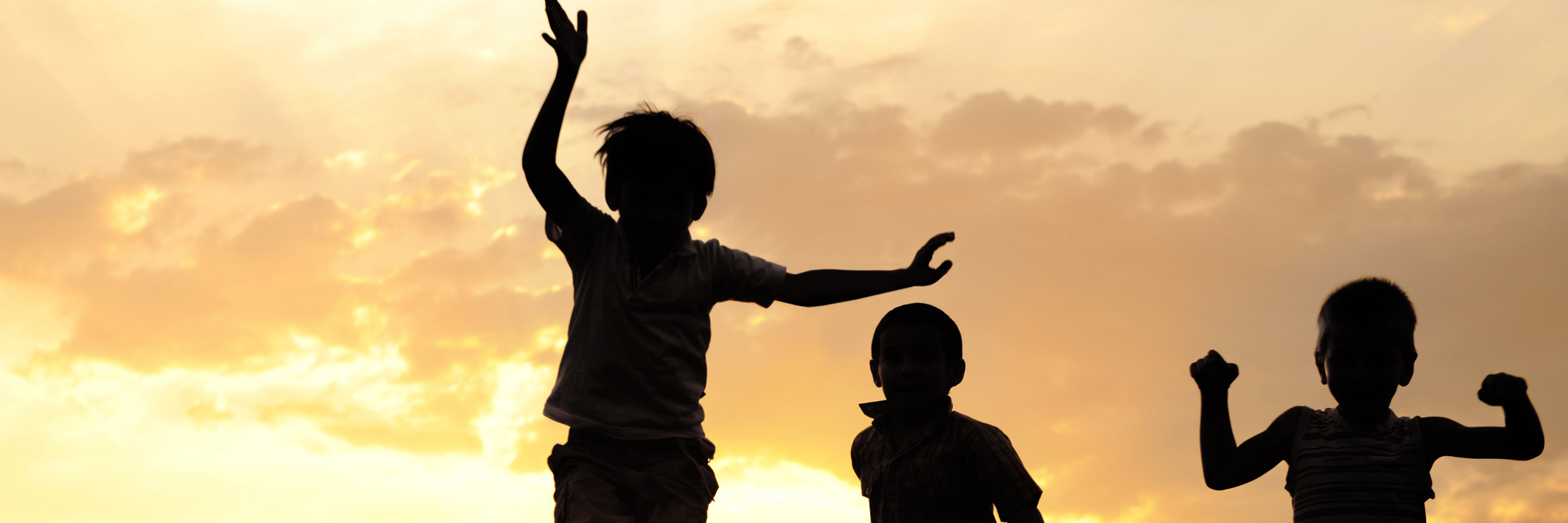Being told, “Your child has cancer” is devastating. If you combine that news with the uncertainty of what lies ahead, countless hours of tests and surgeries, and the financial responsibility of hospitalization and treatment, it becomes even more difficult to face. There is no one-size-fits-all way for a parent or caregiver to manage a child’s cancer diagnosis.
We partnered with Rally Foundation for Childhood Cancer Research, a nonprofit that empowers volunteers across the country to raise awareness and funds for childhood cancer research, to ask readers to share “unexpected” coping techniques when it comes to managing their child’s cancer diagnosis.
Here are their answers:
1. “I actually took up a hobby during this time. With all the things cancer takes from us, I needed something I could control. I started painting furniture out of my kitchen (I use chalk paint so there are no fumes or harmful toxins to worry about). My cancer fighter has even painted a few pieces. It’s calming and there are no time constraints — I just work when I can.” — Jessica C.
2. “[My son] was always pranking the nurses, so whenever he would complete chemo or a BMA, we would buy Jelly Belly jelly beans – the really gross ones – to get the nurse to try or play hide and seek. Just something fun since we were at inpatient forever!” — Shamika M.
3. “When I drive my teenage son to chemo we listen to the band Nickelback. Not necessarily something I would have done with him before. But he’s in a good mood when we get there. It’s the little things.” — Debbie G.
4. “Wow, what ‘cancer parent’ couldn’t write a book about this topic? Cancer tried to steal everything from our family! It wants to not only kill the inside of your child’s body, but also destroy life as you know it. [My daughter] and I found songs that encouraged her to fight as she endured radiation (“I’m a Survivor”) and enveloped us as we broke when she began to lose her hair for the first of four times (“I Won’t Let Go”). One of my favorite unexpected coping techniques was to go to the gym, sit on top of a life-sized dummy with boxing gloves on, and hit its head over and over again as I pictured the tumor that forever changed our lives. We let go of people and things that were no longer important because cancer has a way of putting life in perspective. We learned how to have fun as a family again and now treasure the daily laughter we share in our home.” — Penny S.
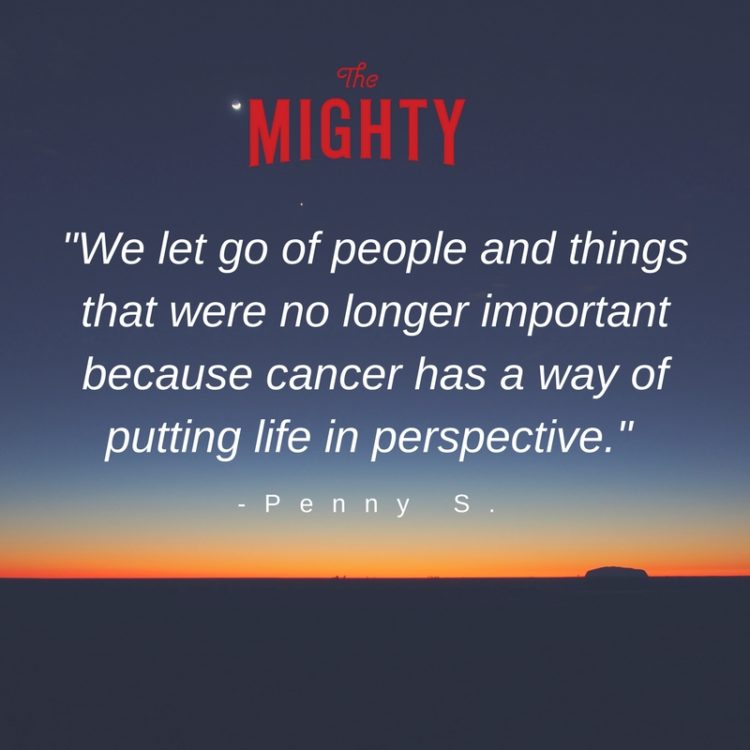
5. “When my daughter was initially diagnosed we stayed in our room. I thought we would get through this alone. Not only is that impossible, but it’s also a terrible idea. I eventually ventured out of our room to find an incredible support system. The childhood cancer community is the embodiment of what the world should look like. No one cares about your race, religion, socioeconomic status, etc. Families bond over experiencing the toughest times in their lives. Once you’re told your child has cancer, our community embraces you like a warm, soft blanket. Many of my dearest friends are fellow cancer parents, and they’ll continue to be my friends for life.” — Tami A.
6. “We always tried to find something for our daughter to look forward to during treatment. On spinal tap/chemo days she always got to eat from her favorite restaurant. When at inpatient, we went for many walks while she rode in her favorite red wagon. For two and a half years we listened to ‘Let It Go’ every single time we made the 45-minute drive to the hospital because it always made her feel better. For us, something to look forward to and a familiar routine helped during our daughter’s journey.” — Jamie M.
7. “OK, lots of memories have been triggered here. After the initial shock and leaving the ICU unit after two weeks, we decided the best way to cope with our new normal was laughter. We had some amazing nurses who would play pranks with [my son] — and silly string was his favorite. When the medicine that had a bad taste had to be done, the nurses would play more daring games and used the syringe to taste things they disliked (one really didn’t like orange juice). After treatments we would stop off at the Waffle House and celebrate another treatment complete — and Clean Plate Club was formed. Throughout the treatment we also kept the little blue bags in every car. The last unexpected coping technique was joining others each weekend to run or walk many miles to train for half marathons. I never would have done this on my own, but the kiddos and the cause will drive you to do the unthinkable.” — Tina W.
8. “We learned to laugh and think of any way to make circumstances more fun whenever possible. We took a practice putting green and favorite board games to the hospital room for the four-day stays. Our son would play putt putt betting games with his friends who visited — all with an IV pole attached and a bucket nearby. Our favorite nurses would drop by and go in and out of Monopoly games.” — Elaine K.
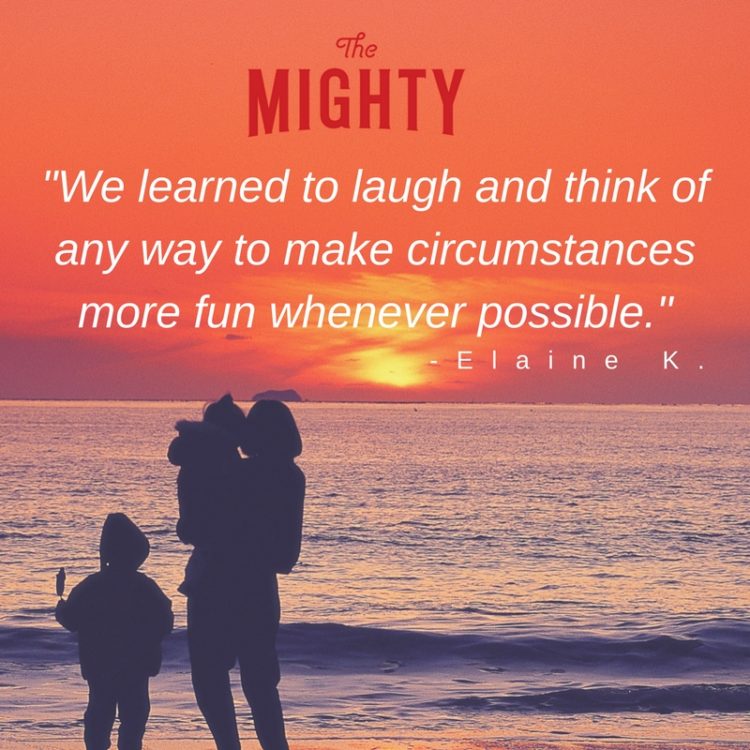
9. “For me personally, I had a wardrobe that was only worn during hospital stays. Comfortable mix-and-match clothes that could be layered for different temperatures. I also had a complete set of toiletries that stayed in my car 24/7 and were only used at the hospital. And I had a dedicated office rolling cart for clinic days I kept stocked with a change of clothes, snacks, bottled water, some form of entertainment and change for the vending machines. Not necessarily unexpected, but I journaled throughout my daughter’s treatment… fairly openly on a public blog and more brutally honest in a ‘for my eyes only’ cheap spiral notebook. I really think the journaling kept me from going completely insane. There’s a completely different list of coping techniques used to help my daughter through her treatment.” — Amy S.
10. “I rearranged my priorities and learned not to let what I thought were big things control me. As I learned, those really were small things. I learned people want to help, and you should let them, as we were overwhelmed with support from friends, family and total strangers. I became a better person, father and husband. I’ve become razor-sharp focused at work, getting the same work done in less time, so to spend it with my family. Let me share this story: we bought our first new van last year. I brought it to the dealer for its first service — with less than 5,000 miles on it — as we were getting ready to leave on a trip. Well, the tech wrecked the van pulling into the service bay. The service manager called me to come back to the shop. I could tell she didn’t have good news. She told me our new van was damaged, and I could see her shoulders sink. Two years ago I would have lost my cool, but all I said was, ‘It’s OK. You can fix it, right?’ ‘Yes, we will take care of everything.’ ‘No problem then.’ The story gets better. It was fixed in a few days so we left for our trip. We got set up in our room and needed to go get some food from the store. As I was leaving for the store I see a lady looking at our van. As I get closer I can see a small dent and scrape marks where she hit it while parking her truck. I just got it back three days earlier from the shop! She goes, ‘I’m so sorry I hit your van, here is my insurance information. I called the police to make a report for you.’ She happened to be the head jailer at the local sheriff’s department. Well it can get fixed when I get back home. So we had our first brand new van ever and it was wrecked twice with less than 5,000 miles on it and neither were our fault. I went to the condo we had on the beach and reflected. [Our daughter is] on her way back recovering, we have the opportunity of a fantastic week on the beach with people who love us and the van will get fixed good as new. So why in the world would I get upset over something so trivial? I thought this was a big thing, in the past, but it took a tragedy to learn what was really important.” — David F.
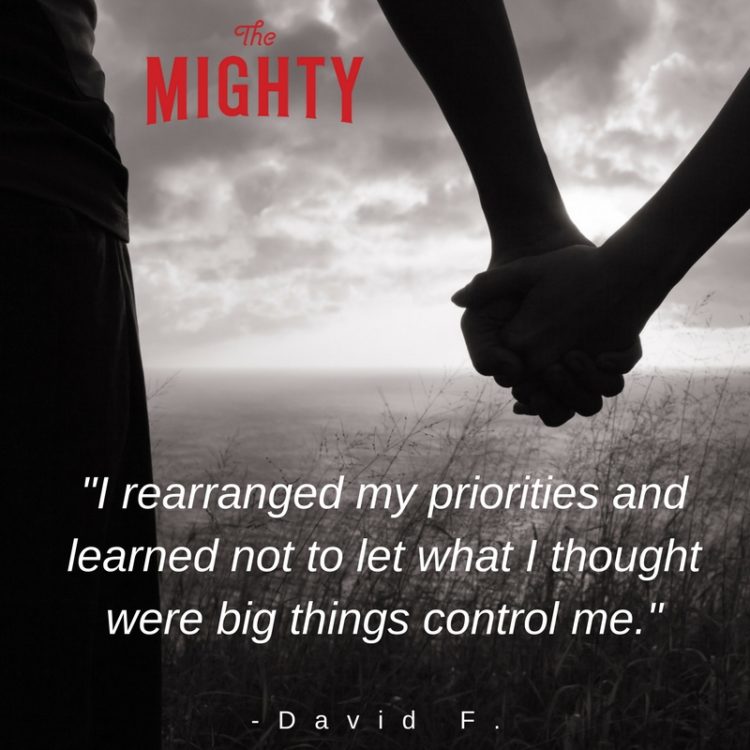
11. “My son loved Spider-Man and superheroes, so we would watch ‘Spider-Man’ over and over and over, hundreds of times. He would also dress up like superheroes and be in costume much of the time. He also knew that when he was in the hospital he was King and could order room service whenever he wanted, and if he was feeling well he could go out of the room and do whatever activities he wanted. In the hospital he was King!” — Michael G.
12. “When my daughter was diagnosed my husband and I would take turns going home during the day (until bedtime) to spend time with our sons, then 1-year-old and 2-weeks-old. During that time at home with them it took a lot to try to get my mind off ‘not being there in the hospital’ and focusing on them. So I walked around my yard barefoot (and there is a name for this — earthing — who knew). It would calm me. I started doing this at the hospital and making my daughter do it, too (even though the hospital just laid fresh sod out with signs everywhere not to walk on it). I didn’t care. She wasn’t walking so this was therapy for both of us. Still, to this day, I will walk barefoot on grass, sand — wherever I can. I also would pull weeds in our yard. My husband is thankful for that.” — Shannon P.
13. “I have really worked out a lot of my feelings through blogging and journaling, both during my daughter’s treatment and after. To gain some semblance of control over a situation that is not controllable I am actively involved in volunteering and raising money for childhood cancer research.” — Ellen G.
14. “We let [our daughter] be involved in her treatment as much as possible. She would help the nurses push IVs, remove bandages or help with the thermometer.” — Jeff H.
15. “Wow, it’s really hard to answer this question since our daughter’s diagnosis was so long ago. But here are a few things that first come to my mind: We learned the names of (and made friends with) almost all of the hospital staff who we came into contact with on a regular basis — from the nurses, custodians, cafeteria staff, X-ray and CT scan technicians — and even gift shop workers. This made us feel like a real part of the community we spent most of our time in. We also tried to keep our family ‘tradition’ of eating dinner together as often as possible. By bringing our young healthy daughter to the hospital to be with her sister — who was fighting childhood cancer — we could all have dinner there together. We would meet up in the hospital cafeteria and have our family time and meal before one of us had to head back home to take care of the healthy child while the other stayed the night in the hospital. Lastly, I can quote my daughter’s words of wisdom to other kids in the hospital after she had spent extended time there (and it helped us all tremendously): ‘Don’t ever give up, have a positive attitude and always find something to be thankful for each day.’” — Robin R.
16. “Humor. From pranks on the nurses to amputation jokes that would make others outside of our family cringe. When we weren’t crying we were laughing. Many times, inappropriately.” — Tiffany M.
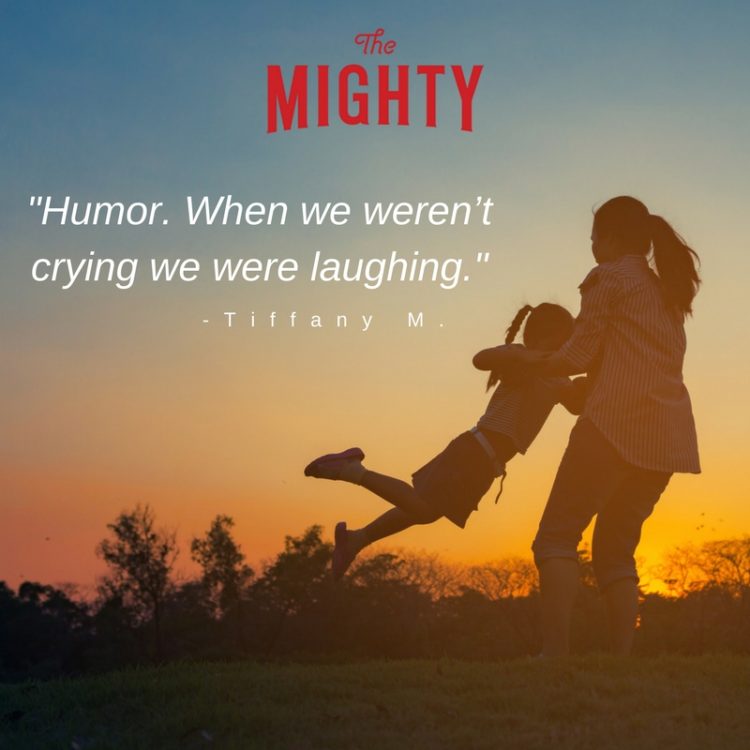
17. “As many stated above, humor. We called ours ‘brain tumor humor!’” — Tiffany S.
18. “Honestly, I held it all in. I didn’t cry except when I told people her diagnosis. We tried to stay strong for her and everyone else who was breaking down. I felt like I never had a chance to break down. Everyone else around us was playing the ‘poor us’ game, and well, we never got the chance to really break down. We went into fight mode! We researched everything we could before our upcoming appointment to find out if it was really retinoblastoma. We educated ourselves on every option out there for our little girl, as there isn’t a set treatment plan for RB. It took almost a month of fighting to get her in for her treatment. So I would say we coped by going into fight mode at first. After the initial shock was over we found and met others with the same diagnosis (not too many kids out there). I found comfort in messaging them. Asking questions and knowing someone else was out there like us. We also vowed to spend as much time with our girls (3 and 1 years old at the time). We never took anything they did for granted!” — Lindsey H.
19. “[Our son] would have a difficult time getting accessed. He gets to open a present every time he gets accessed. It’s helped and he no longer cries. Every time he gets a lab draw he gets to get something out of the vending machine. Highlight of his day.” — Cherie T.
20. “When [our daughter] was diagnosed she was in college. She withdrew and spent the next year at the hospital. She shut down emotionally and she was so overwhelmed. I purchased all the feeling emoji stuffed toys and the ‘Inside Out’ characters. Each day on the chair she would orchestrate a scene whether good or bad — some days they were falling into the trash can or emesis bags. The team would come seeking the scene each day. I wrote a blog, reaching out to families globally. It was lonely. Many families qualified for the different trips and programs because of age, but she was over 18 with a pediatric cancer. We took an online class on gender — imagine the conversations when she was on medication. Mobile waiters delivered real food and Disney Thomas Kinkade puzzles.” — Heather M.
Are you a parent who has used some “unexpected” coping techniques to manage your child’s cancer diagnosis? Share them in the comments below.
Thinkstock photo by Zurijeta

